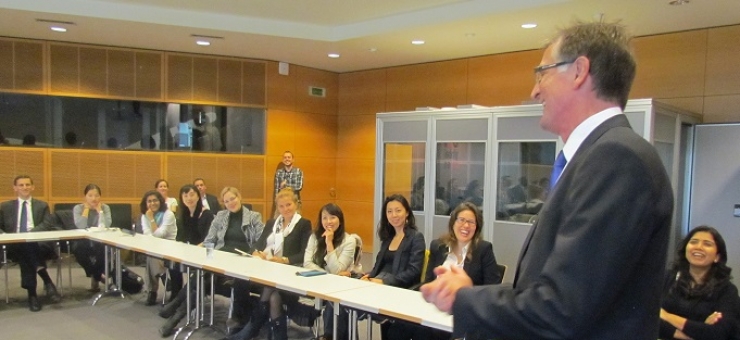UNI chief’s message to young leaders

30 World Economic Forum Fellows hoping to become the global leaders of tomorrow have visited UNI HQ for a meeting on leadership and the labour movement with General Secretary Philip Jennings.
The Fellows, who are at the beginning of a three-year programme, were selected by the World Economic Forum in the hope of finding the next generation of leaders for both the forum, and the world as a whole.
Their programme combines a professional position at the forum with several weeks per year of intensive training and development, one-on-one coaching and mentoring, and in-depth training in industry, civil society and government.
Philip Jennings said, “We have welcomed these young leaders to a trade union house, and they will take an important message away with them today.
“That message is dignity in work, economic inclusivity for working people, a stronger labour movement – these are the keys to future global prosperity and better living standards for all.”
Fielding questions on the importance of trade unions in today’s global economy, Jennings said, “You will not improve the lives of working people with the political thinking we see in evidence today. Politicians do not seem to understand the lives of working people or empathise with the difficult life that many working people are forced to suffer. They don’t get it.”
“To improve the situation of working people you need a strong institutional structure dedicated to improving peoples’ lives. If you look at the decline in the labour movements in countries like the United States, and you look what happened in terms of inequality, you have to draw the conclusion that a weaker labour movement has led to a weaker middle class and higher inequality.”
In a wide-ranging discussion on the global supply chain, Jennings explained the significance of the Accord on Fire and Building Safety in Bangladesh, the contract that UNI and IndustriALL Global Union brokered with multinational clothing brands earlier this year in the wake of a series of deadly factory fires and collapses.
“We had to change the rules of the game,” he said. “We realised that if we didn’t do something quickly and make it demanding, the opportunity would be lost.”
103 brands have now signed the Accord, which aims to guarantee a safe and sustainable garment industry for Bangladesh. Over 1,500 factories are covered by strict independent safety regulations.

